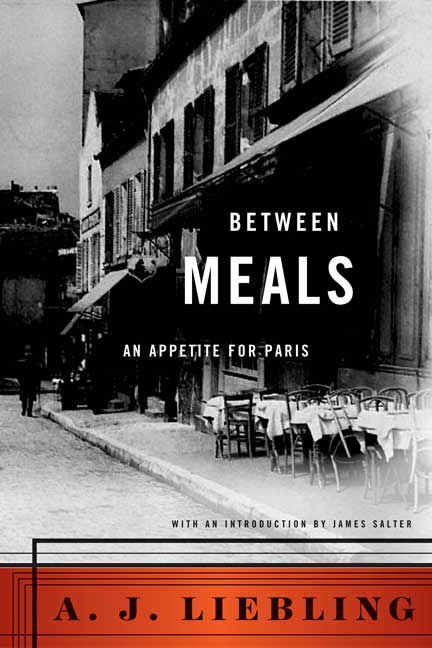Books |
Between Meals
A.J. Liebling
By
Published: Nov 15, 2022
Category:
Food and Wine
In 1926, A.J. Liebling had graduated from college and bungled his first job as a reporter in Providence, Rhode Island. It seemed to his father that this was a good time for him to study for a year in Europe. Liebling pretended to protest. "I’m thinking of getting married," he lied. "Of course, she’s ten years older than I am…." The story of his romance — which was utterly fabricated — worked like a charm. His father, eager to help his son avoid a disastrous marriage, not only bought him a steamship ticket, he gave him a $2,000 line of credit. And Liebling went to Paris and began to eat.
Happily for Liebling, he had "just enough money" — that is, he had to think hard whether to spend the six francs he had earmarked for dinner on a better wine and a lesser beef or settle for vin ordinaire and a "generous, sanguine contre-filet." This is, as any food-lover knows, not a small question. There are, as Liebling points out, only two opportunities for culinary investigation each day. Only a fool would waste even one. (Rich people, in Liebling’s view, tend to be fools because they go to "great" restaurants and order what we now think of as "designer food." They are, as a result, "unlikely to make the acquaintance of meat dishes of robust taste.")
There are some passages about boxing and theater in this slim (182 page) book. Unless those are your obsessions, let your eye pass quickly over them. Food is Liebling’s great topic, and that’s what you’re here for. And on this subject, Liebling delivers one great scene after another. [To buy the paperback from Amazon, click here. For the Kindle edition, click here.]
My favorite is the visit of Liebling’s parents to Paris. Liebling takes them to a restaurant he has never been to — the place is famed for modest decor, worn tablecloths, great cooking and "staggering" bills. Liebling tells the owner that his father, a New York furrier, is "the richest man in Baltimore." The owner, beaming, says he will choose the menu himself. And, along with an array of dazzling wines, he presents the Lieblings with this dinner: vegetable soup, trout, boiled chicken, an omelette au kirsch for dessert. "The simple line of the meal brought out the glories of the wine, and the glories of the wine brought out the grandeur in my father’s soul," Liebling writes. The Lieblings returned for three more nights.
And there are the legendary eaters, a breed we no longer see. Here’s Liebling on a friend who goes to a favorite restaurant intending to order a "light" meal: "a dozen, or possibly eighteen oysters, and a thick chunk of steak topped with beef marrow." But when he arrives, the owner announces that he has saved two portions of cassoulet for him. What to do: skip the steak or hurt the owner’s feelings? This was no crisis. Liebling’s pal "ate the cassoulet, then enjoyed the steak. The oysters offered no problem, since they present no bulk."
Liebling would become fat and unhealthy. Talented, self-destructive — the word "complicated" was invented for Liebling. It is, however, a joy pure as Montrachet to revisit his youth, when he ate with gusto and the future was an unbroken vista of remarkable meals. Reading this book, you will feel both sated and anticipatory. Just like Liebling after a two-hour lunch.


